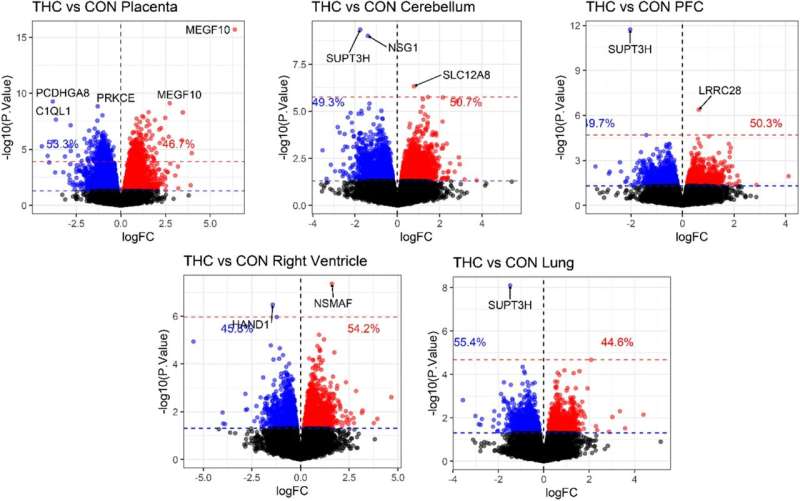This article has been reviewed according to Science X's editorial process and policies. Editors have highlighted the following attributes while ensuring the content's credibility:
fact-checked
trusted source
proofread
THC use during pregnancy linked to changes in fetal development

Oregon Health & Science University researchers showed that consuming THC while pregnant could potentially affect development of the fetus and lead to life-long health impacts for offspring.
The preclinical study was published today in the journal Clinical Epigenetics.
Delta-9-tetrahydrocannabinol, or THC, is the main psychoactive ingredient in cannabis, a substance growing in popularity and availability in the United States. The prevalence of cannabis use in pregnancy is also rapidly increasing, especially during the first trimester—a time when the fetus is most vulnerable to environmental exposures—to mitigate common symptoms like morning sickness. However, the potential effects of prenatal cannabis use on fetal development remain inconclusive, in part due to a lack of safety data. This study aimed to identify the potential long-term health impacts of THC use during pregnancy.
In a non-human primate model, OHSU researchers found that exposing a pregnant subject to THC altered the placental and fetal epigenome —including the chemical modifications to DNA responsible for gene regulation and expression, that is telling genes what, where and when to do something. Researchers also found that that these changes to gene regulation and expression are consistent with those seen with many common neurobehavioral conditions, including autism spectrum disorder.
"Cannabis is one of the most commonly used drugs and is widely available across the country, so there is a common perception that its completely safe to use," said the study's lead author Lyndsey Shorey-Kendrick, Ph.D., a computational biologist in the Division of Neurosciences at OHSU's Oregon National Primate Research Center, or ONPRC.
"The reality is that cannabis still carries many health risks for certain populations, including those who are pregnant. If we're able to better understand the impacts, we can more effectively communicate the risks to patients and support safer habits during the vulnerable prenatal period."
In a model using nonhuman primates, researchers administered THC in a daily edible and compared its effects to a group receiving a placebo. Specifically, researchers evaluated the epigenetic changes in several key areas that indicate healthy prenatal development: the placenta—the disk of tissue that connects the umbilical cord and uterus—and fetal lung, brain and heart.
When looking at these areas, analyses showed that THC exposure altered the epigenome, meaning a process in which the information encoded in a gene is turned into a function or observable trait. Genes—the segments which make up DNA—are all specifically coded to contribute to different functions of the body and brain, so any impact on epigenetic processes due to drug exposure is concerning, especially during a critical developmental window such as pregnancy.
Researchers found that significant changes involved genes associated with common neurobehavioral disorders, including autism spectrum disorder and attention deficit hyperactivity disorder. These conditions are linked to adverse health outcomes in childhood and adolescence, including poorer memory and verbal reasoning skills, and increased hyperactivity, impulsivity and inattention.
The research team, which includes Eliot Spindel, M.D., Ph.D., Elinor Sullivan, Ph.D., Owen McCarty, Ph.D., and Jason Hedges, M.D., Ph.D., hopes findings from this study will add to the limited existing literature on THC use during pregnancy, and help guide patient counseling and public health polices focused on cannabis in the future.
"It's not common practice for providers to discuss cannabis use with patients who are pregnant or trying to conceive," said the study's corresponding author, Jamie Lo, M.D., M.C.R., associate professor of obstetrics and gynecology (maternal-fetal medicine), OHSU School of Medicine, and Division of Reproductive and Developmental Sciences at the ONPRC. "I hope our work can help open up a broader dialog about the risks of cannabis use in the preconception and prenatal period, so we can improve children's health in the long run."
More information: Lyndsey E. Shorey-Kendrick et al, Prenatal delta-9-tetrahydrocannabinol exposure is associated with changes in rhesus macaque DNA methylation enriched for autism genes, Clinical Epigenetics (2023). DOI: 10.1186/s13148-023-01519-4




















